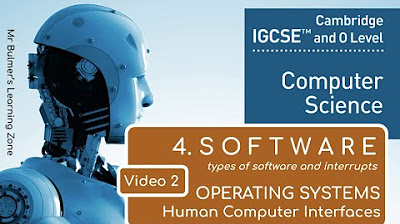Is an MIS Degree Your Perfect Fit? 🤔 | MIS vs CS? | Careers, Curriculum, and Opportunities 🎓
Summary
TLDRThis video delves into the Management Information Systems (MIS) degree, contrasting it with Computer Science. It bridges technology with business, focusing on solving business problems with technology. Ideal for those with a quantitative background and relevant work experience. The course covers business and technical aspects, with specializations available. Graduates can pursue careers in consulting, tech, banking, finance, retail, data analytics, and product management, with median salaries ranging from $99,000 to $150,000.
Takeaways
- 🎓 An MIS (Management Information Systems) degree acts as a bridge between technology and business, focusing on solving business problems with technology.
- 📚 The main difference between an MIS degree and a Computer Science degree is the focus; MIS is business-oriented, while Computer Science is more technically focused.
- 👨💻 Ideal MIS candidates have a quantitative undergraduate background, good academic standing, and relevant work experience in business analysis or IT sectors.
- 💼 MIS graduates can pursue careers in Consulting, Technology, Banking and Finance, Retail, Data Analytics, and Product Management.
- 💰 Median salaries for MIS graduates range from $99,000 to $150,000, depending on the sector and role.
- 🏫 The coursework of an MIS degree typically includes general business education and technical parts like systems design, data analytics, and programming.
- 🌟 Top sectors for MIS graduates include management consulting firms like BCG and McKinsey, technology companies, and banking and finance institutions.
- 🌐 The video series will continue with part two, focusing on the top five universities for MIS degrees.
- 📈 Gradvine has helped numerous students get into top universities for MIS degrees and offers free consultations for personalized guidance.
- 📈 For those aiming for a career in product management or consulting after an MIS degree, it's possible with the right course structure and specializations.
Q & A
What is the primary focus of a Management Information Systems (MIS) degree?
-The primary focus of an MIS degree is to serve as a bridge between technology and business, with an emphasis on identifying business problems that technology can solve and determining the right personnel to address those issues.
How does an MIS degree differ from a Computer Science degree?
-While both degrees may have similar coursework, an MIS degree is more focused on business processes, leadership, and databases from a business perspective, whereas a Computer Science degree concentrates more on the technical aspects such as operating systems, information structures, and programming.
Who should consider applying for an MIS degree?
-Individuals with a quantitative undergraduate background, a good academic standing of at least 3.2 on a 4.0 scale, and relevant work experience in business analysis, software development, or the IT sector should consider applying for an MIS degree.
Is it necessary to have a Computer Science undergraduate degree to apply for an MIS degree?
-No, it is not necessary to have a Computer Science undergraduate degree to apply for an MIS degree. The program is designed to attract students from diverse backgrounds, including those without a Computer Science degree.
What are the two main components of the coursework in an MIS degree?
-The coursework in an MIS degree is generally divided into two components: general education on business, which includes courses like macroeconomics, leadership, and systems design, and the technical part, which includes information theory, systems design, data analytics, data science, and database management systems.
Can an MIS degree lead to a career in product management?
-Yes, an MIS degree can lead to a career in product management. The degree provides a foundation in both business and technology, which is highly valuable in product management roles.
What are the potential career paths for graduates with an MIS degree?
-Graduates with an MIS degree can pursue careers in management consulting, technology sector companies, banking and finance, retail, data analytics firms, and product management.
What is the range of median salaries for professionals with an MIS degree?
-The median salaries for professionals with an MIS degree can range from $99,000 to $150,000, depending on the sector and the specific roles they are involved in.
What is the structure of the video series on Management Information Systems?
-The video series on Management Information Systems is structured in two parts. The first part explains what an MIS degree is, its differences from a Computer Science degree, and potential careers. The second part will cover the top five universities for MIS degrees.
How can viewers get personalized guidance on their Master's journey in MIS?
-Viewers can get personalized guidance on their Master's journey in MIS by scheduling a free consultation with Gradvine, where they will receive advice on the right course and universities based on their profile.
What kind of services does Gradvine offer in addition to free consultations?
-In addition to free consultations, Gradvine offers paid services where they work on behalf of students to provide further assistance in their Master's application process.
Outlines

Cette section est réservée aux utilisateurs payants. Améliorez votre compte pour accéder à cette section.
Améliorer maintenantMindmap

Cette section est réservée aux utilisateurs payants. Améliorez votre compte pour accéder à cette section.
Améliorer maintenantKeywords

Cette section est réservée aux utilisateurs payants. Améliorez votre compte pour accéder à cette section.
Améliorer maintenantHighlights

Cette section est réservée aux utilisateurs payants. Améliorez votre compte pour accéder à cette section.
Améliorer maintenantTranscripts

Cette section est réservée aux utilisateurs payants. Améliorez votre compte pour accéder à cette section.
Améliorer maintenantVoir Plus de Vidéos Connexes

Computer Science Careers and Subfields

Why IT Management and MIS Are the Smartest Majors in 2024

Is a MANAGEMENT INFORMATION SYSTEMS degree worth it in 2024?

Sistem Informasi Manajemen (SIM) - Bahasan Kuliah Pertemuan Pertama

IGCSE Computer Science 2023-25 - SOFTWARE: Video 2 - THE OPERATING SYSTEM

Management Information System - A-Z of business terminology
5.0 / 5 (0 votes)
